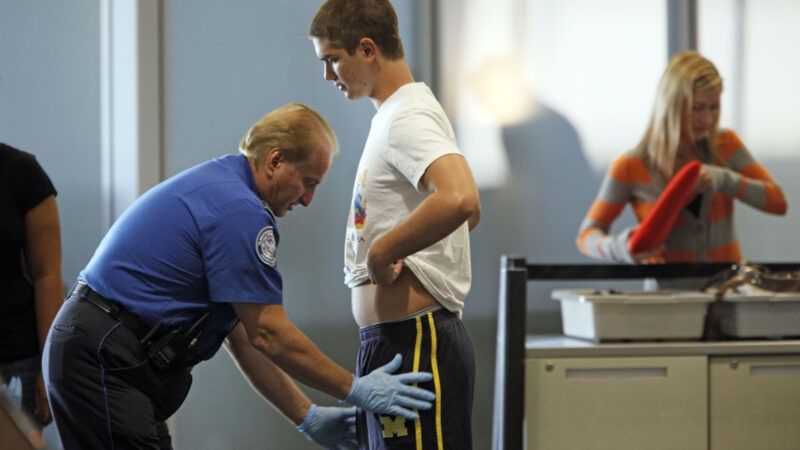TSA Gets $400 Million for Pay Raises in Omnibus Spending Bill
The bill also gives TSA employees the power to collectively bargain, which means more pay raises are likely in the future.

Tucked into the 4,000-plus-page omnibus spending bill that's making its way through Congress this week is a provision that will provide huge pay increases to Transportation Security Administration (TSA) workers and will make the agency more difficult to abolish or privatize.
The omnibus bill incorporates portions of a bill passed by the House in July that aimed to bring TSA employees under the same rules that apply to all members of the federal workforce—including scheduled pay increases and full collective bargaining powers. Rep. Bennie Thompson (D–Miss.), that bill's sponsor, said at the time that its passage could provide average pay increases of about 30 percent to current TSA employees. The bill aimed to put TSA screeners on the same pay scale as other Homeland Security Department agencies, like U.S. Customs and Border Protection, according to Government Executive, a trade publication covering the federal bureaucracy.
The omnibus bill includes only $397 million in new funds for the TSA—down from the $1.6 billion that would have been required to fund those massive pay increases. Even so, TSA agents are set to get smaller pay raises and collective bargaining powers that will effectively ensure further pay increases in future years.
"I am pleased that we are closing out this Congress by providing much-needed improved pay and collective bargaining rights for TSA's frontline workforce," Thompson said in a statement on Tuesday. Even though the omnibus bill does not put the TSA into the federal pay scale system governed by Title V, as Thompson's bill originally intended, the congressman noted that "this funding still represents by far the biggest advancement for the workforce in TSA's history. With this new funding, TSA should be able to start providing pay raises as early as July of next year."
As part of the omnibus bill, the TSA is also getting $61 million to hire new workers.
The raises might rightfully infuriate Americans who have to keep paying the tab for (and keep getting fondled by) a federal agency that, more than 20 years after it was created to combat airplane-related terrorism, has still never foiled a single attack and routinely fails to stop weapons and other illegal substances from being smuggled aboard commercial aircraft. The federal government is more than $30 trillion in debt and borrowed nearly 50 cents of every dollar spent last month, so fattening the paychecks of the rent-a-cops who patrol the nation's airports probably shouldn't be a top priority—but the same thing could be said for a host of other items in the omnibus bill.
The bigger issue, however, might be the slow-motion effort to incorporate the TSA into the rest of the federal workforce, which is something that public sector unions and the Biden administration are both pushing. That's a big change from how the TSA was initially conceived. The agency was deliberately siloed off from the rules governing most other federal employees—for good reason.
"The fundamental problem with TSA is that there is an inherent conflict of interest between an aviation security regulator also providing the security services it is supposed to be regulating," explains Marc Scribner, senior transportation policy analyst with the Reason Foundation, which publishes this website. "This latest move follows a string of actions by Congress and the administration that have compounded the problems baked into the TSA's flawed institutional design from the beginning."
The TSA ought to be privatized or abolished. Instead, it's getting more expensive and further cemented into the federal bureaucracy.
